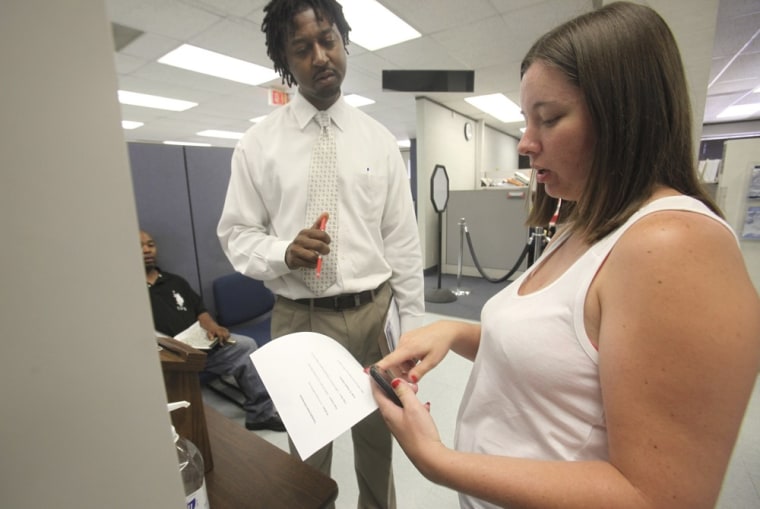The long-term jobless face a big dilemma when it comes to hunting for a job — a lack of recent references.
Maybe you haven’t worked for six months or a year and don’t have someone who can vouch for what you’ve been doing; or your references are out of work themselves. It’s a problem hiring managers and recruiters are seeing more often, and it’s a problem that job seekers have a tough time grappling with.
Earlier this month, Bruce Hurwitz, CEO of recruiting firm Hurwitz Strategic Staffing, had a finalist for a position with a company where he places employees. When Hurwitz asked for references the candidate sent three names: His clergyman, a man that introduced him to his wife and his brother-in-law.
“My client literally laughed this person's candidacy away,” Hurwitz recalled.
Unfortunately, failing to come up with solid, professional references can doom your job search.
“Serious reference checking tends to happen late in the hiring game after interviews but before a final decision is made,” explained William Holland, author of “Cracking the New Job Market: Seven Rules for Getting Hired in Any Economy.”
“As such, those without recent references are often eliminated well before their resume reaches the desk of a hiring manager,” Holland said. “And where there is no HR department to act as a buffer, those without recent references are eliminated shortly after a resume is received. Most never get serious consideration.”
Still, some hiring managers understand the tough job market right now and are willing to give candidates a chance.
“I don’t think it’s a negative because of the state that we’re in,” said Jennie Dede, vice president of recruitment for Adecco, an HR solutions company. However, she added, “it’s important for [hiring managers] to have someone recent speak on their behalf.”
It’s the same problem, that people with jobs often face because in most cases they can’t use their present manager as a reference anyway, she pointed out. In such cases, she said, she’s open to talking to co-workers, former bosses at the company, or colleagues from other departments.
But without such options for someone who’s been out of work for many months, or even a few years, it’s time to get creative.
“Employers are acting in their best interest” when they’re apprehensive about hiring someone with dated references, author Holland said.
“Their job is to reduce their risk of hiring the wrong person,” he added. “The applicant has to convince the potential employer they are the right applicant.”
To that end, if you have stale references you should freshen them up, Holland said.
“Go back and talk to those references you had from the past and tell them what you’ve been doing since they last worked with you and assure them that your skills are still current,” he said. “Get your references to attest to that. It’s very important that his references say, ‘He and I have been in touch and his skills are still intact.’”
And think beyond just your former bosses or coworkers. You can use subordinates and even customers that you worked closely with at your former company, Holland said.
The time to connect with old references is as soon as you know someone is taking you seriously as a candidate.
Holland offered this possible conversation:
“Martha, I’m in the job market and it’s been a tough go. I’d like to put you down as a reference even though we worked together many years ago. I want to have a conversation about me, and see if you’re in a position to vouch for me, for the work I did for you. If you are, I’d like to bring you forward and talk about where I am now.”
If you’ve been out of work for a while and can’t find anyone who’ll vouch for you, you may want to consider doing some temp work just to get some contacts who can endorse your work.
“A client of mine has been working for two years as contingent supply-chain executive. As such, he is well positioned to re-enter the workforce on a full-time non-contingent basis as the economy improves,” Holland explained. “Women have been fighting this battle for years and are now aided by such companies as Mom Corp. Inc. that use the same approach. In both instances, individuals remain active with references that are ‘current’ even though they are not employed in a traditional sense.”
Adecco’s Dede said job seekers could tap anyone who knows them on a professional basis.
“References are meant for professional opinions,” she added. They’re meant to come from people you’ve worked with in some capacity, whether you were paid for that work or not.
Indeed, many employers are willing to use references from volunteer work, such as working on the PTA.
And don’t rule out a counselor at your local unemployment office, Dede said.
“They can offer a good picture beyond a piece of paper,” she said. “Is the person coming to appointments on time? Are they trying hard to find work, etc.?”
These are questions a counselor may be willing to discuss, she added.
You can also use references from part-time jobs that aren’t related to the job you want but you took on for financial reasons, said Craig Libis, a recruiter for Executive Recruiting Consultants.
Another avenue for references can be found on social media sites.
Many hiring managers, Libis said, never even check the references they’re giving by applicants.
“They know it’s somebody that’s going to give them a glowing recommendation,” he maintained, adding that an increasing number of companies now have strict policies barring employees from providing references.
“They want to dig deeper and find that person not listed as a reference,” he said. And many are turning to social media sites to find those individuals and to see how many contacts and recommendations job candidates have on sites such as LinkedIn, Twitter and Facebook.
“Are they better than traditional references? Not necessarily,” he admitted. “But they certainly don’t hurt.”
